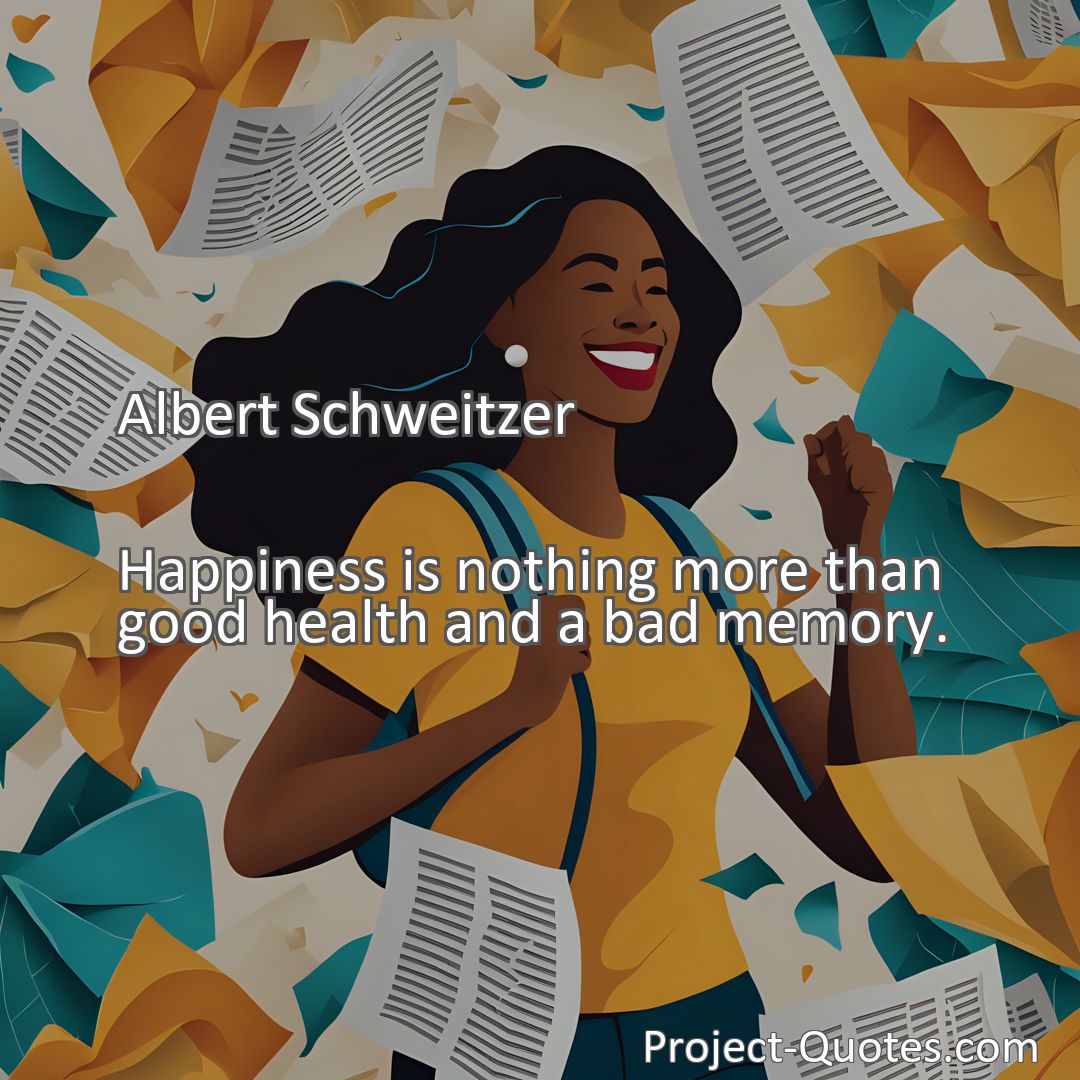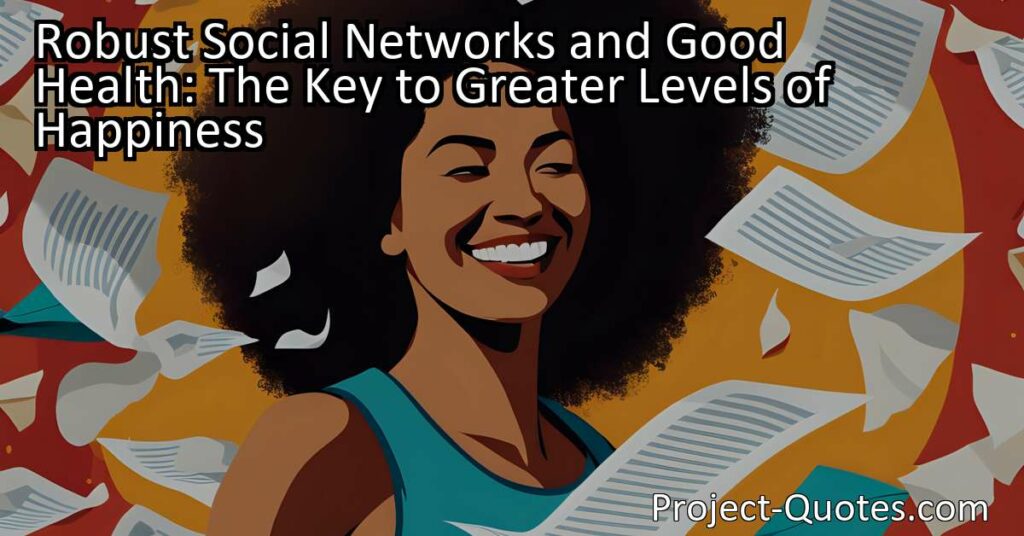Happiness is nothing more than good health and a bad memory.
Albert Schweitzer
Robust social networks play a crucial role in achieving greater levels of happiness. Studies have consistently shown that individuals with strong connections to family, friends, and loved ones experience higher levels of overall life satisfaction. Nurturing and investing in our relationships can significantly contribute to our well-being and happiness.
Table of Contents
Meaning of Quote – Happiness is nothing more than good health and a bad memory.
In today’s fast-paced and often stressful world, the pursuit of happiness is a universal goal. People often wonder what it takes to be truly happy and what factors contribute to a fulfilling life. Albert Schweitzer, a renowned philosopher and humanitarian, once said, “Happiness is nothing more than good health and a bad memory.” In this insightful quote, he highlights two essential components that, when combined, can lead to a deep sense of happiness.
First and foremost, Schweitzer emphasizes the significance of good health in achieving happiness. Indeed, without good health, it can be challenging to fully enjoy life and experience genuine happiness. Imagine waking up every day feeling unwell, burdened by physical ailments or limitations. It would undoubtedly hinder one’s ability to partake in activities, hobbies, and even simple pleasures. Good health allows individuals to engage fully in life, pursuing their dreams and goals with vigor and enthusiasm.
Physical well-being is a foundational element of happiness that encompasses various aspects. It includes maintaining a balanced diet, engaging in regular exercise, and taking care of our bodies. When we make healthy choices and prioritize self-care, we reap the rewards of increased energy, improved mood, and overall well-being. This, in turn, opens the door to a greater sense of contentment and joy in our daily lives.
Nevertheless, good health alone is not enough to guarantee happiness. Schweitzer also emphasizes the significance of a “bad memory.” What exactly does this mean? In simple terms, it suggests that dwelling on past disappointments, traumas, or negative experiences can hinder our ability to experience genuine happiness. Holding onto bitterness, grudges, or regrets can weigh heavily on our hearts and minds, preventing us from fully embracing the present and future.
In our human nature, it is natural to remember both the good and the bad experiences. However, dwelling excessively on the negative aspects can create a cycle of unhappiness. It is essential to acknowledge past difficulties and learn from them but also to let go and move on. By consciously choosing to focus on the positive aspects of life, we can cultivate a healthier mindset and pave the way for greater happiness.
Indeed, living in the present moment and embracing positivity can significantly enhance our overall well-being. Studies have shown that individuals who practice mindfulnessbeing fully present in the current moment and accepting it without judgmentexhibit increased levels of happiness and reduced stress. By training our minds to let go of negative thoughts and instead appreciate the small joys of life, we can start to experience a profound sense of contentment.
Another aspect of a “bad memory” alludes to resiliencethe ability to bounce back from difficult situations and hardships. Life is full of challenges, setbacks, and moments of adversity. However, those who possess resilience can overcome these obstacles and continue on their path towards happiness. Resilience allows individuals to view setbacks as opportunities for growth, rather than allowing them to define their entire existence.
Resilience is cultivated when we face difficulties head-on and look for ways to overcome them. By shifting our mindset and reframing setbacks as temporary detours rather than permanent roadblocks, we can maintain a positive outlook, even in the face of adversity. Developing resilience is a lifelong journey, but it is a vital tool that can enable us to navigate life’s ups and downs and find happiness in the process.
While Schweitzer’s quote suggests that good health and a bad memory are the key ingredients for happiness, it is important to acknowledge the role of external factors in our overall well-being. Happiness is influenced by various aspects of our lives, including our relationships, accomplishments, and sense of purpose. These elements interact in a complex web, ultimately shaping our levels of happiness and life satisfaction.
First and foremost, our relationships with others play a fundamental role in our happiness. Strong, meaningful connections with family, friends, and loved ones provide us with a sense of belonging, support, and love. Studies have consistently shown that individuals with robust social networks experience greater levels of happiness and overall life satisfaction. Nurturing and investing in our relationships can greatly contribute to our well-being and happiness.
Additionally, our accomplishments and sense of purpose give our lives meaning and generate a sense of fulfillment. Engaging in activities that align with our values and passions can bring us immense joy and a deep sense of purpose. Whether it is pursuing a fulfilling career, engaging in hobbies, or contributing to important causes, finding what truly matters to us can lead to lasting happiness.
In conclusion, Albert Schweitzer’s quote, “Happiness is nothing more than good health and a bad memory,” encapsulates the essence of what it takes to be truly happy. Good health forms the foundation for an enjoyable and fulfilling life, allowing us to fully engage in activities and experiences. Simultaneously, cultivating a “bad memory” involves letting go of past disappointments and embracing positivity and resilience. However, it is important to recognize that happiness is a multifaceted concept influenced by various external factors such as relationships, accomplishments, and a sense of purpose. By prioritizing our physical and mental well-being, letting go of negativity, and nurturing positive relationships, we can pave the way for a happier and more fulfilling life.
I hope this quote inspired image brings you hope and peace. Share it with someone who needs it today!


